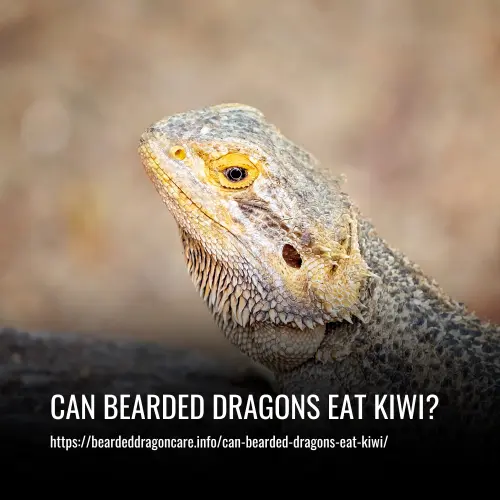It turns out that bearded dragons do eat centipedes. In fact, they will even eat millipede larvae. But not just any kind of centipede. They only eat certain kinds of centipedes. And they won’t eat the same ones every day.
I’ve spent years researching this topic and I’m here to share my findings with you. I’ll explain why bearded dragons eat centipedes, where they find these centipedes, and how you can get your hands on some yourself.
If you’d like to learn more about bearded dragons, check out my article about bearded dragons.
Can bearded dragons eat centipedes and become poisoned?
Centipedes are poisonous insects that can cause severe health problems if ingested. But there’s nothing to worry about if your bearded dragon eats only one or two centipede. However, if your bearded dragon ate several centipedes, then you should seek medical advice immediately.
Your bearded dragon may experience mild symptoms after eating centipedes, including vomiting, diarrhea, abdominal pain, and fever. These symptoms usually last less than 24 hours. You should contact your vet right away if your bearded dragon experiences any of these symptoms.
But if your bearded dragon doesn’t show any signs of illness, then you shouldn’t worry. Centipedes are harmless to reptiles, and they won’t harm your bearded dragon.
However, if your bearded dragon does ingest centipedes, then it’s important to keep him away from them until his condition improves. And if you notice any changes in your bearded dragon’s behavior, then you should consult your veterinarian.
What can you do if your beloved bearded dragon eats a centipede?
Centipedes are harmless to bearded dragons. But if your dragon ate a centipede, there are several things you can do to help him or her recover.
First, try feeding your dragon with activated charcoal. Activated charcoal helps remove toxins from his system. You can find activated charcoal at pet stores or online.
Another option is to mix kale, parsley, cilantro, and water in a bowl. Then place the mixture in a blender and blend until smooth. Feed your dragon with this mixture every day for two weeks.
Finally, you can give your dragon a bath to wash away any remaining toxins. Be careful though, because centipedes can leave behind tiny hairs that can irritate your dragon’s skin.
Can A Centipede Kill A Bearded Dragon?
Centipedes are creepy crawly insects that can cause serious harm to humans. But did you know that they can actually kill a bearded dragon?
Bearded dragons are reptiles that live in Australia. And although they may seem cute and cuddly, they can sometimes bite off more than they can chew.
So if you find yourself feeding a centipede to your bearded dragon, you should stop right now. Because chances are, your lizard will refuse it and it could be dangerous if he does decide to eat it.
Plus, there’s no guarantee that the lizard is going to attack the centipede immediately. He might run away instead. And if he does bite the centipede, it could hurt him.
In short, it’s not worth the risk.
Nutritional Value of Centipedes
Centipedes have lower than normal amounts of proteins, calories, fats, and carbs. Here’re some details about their nutrition.
| Item | Amount per 100 g |
| Proteins | 0 g |
| Carbohydrates | 6.9 g |
| Calories | 122 |
| Fat | 0 g |
| Dietary fiber | 0 g |
| Sodium | 12.6 mg |
Why Are Centipedes Bad for Bearded Dragons?
Centipedes are dangerous for bearded dragons. Some varieties of centipedes have a venomous gland in the mouth. This is a mechanism they use to kill their prey when foraging. However, it will do a great deal of harm to your bearded dragons if they get bitten by the animal.
Another reason to avoid feeding your beardies with centipedes is that they can carry parasites that will affect their health. These parasites can cause eye problems such us sunken eyes. They can also affect their digestive systems and negatively impact their overall quality of life.
Bearded dragons are not attracted to centipedes. So, your pet beardie will rarely feed on one unless it is starving or sick. If the centipede is dead and has fully dried out, then it is unlikely to harm your beardie.
However, if you find a live centipede in your house, you can take a photo of it and send it to an expert. He/she will be able to tell you whether the centipede is poisonous or not.
In case your beardie bites a centipede, you can wash his/her mouth with warm water and soap. Do not apply any antiseptic creams or ointments. Also, keep away from your bearded dragon until he/she recovers completely.
Do Centipedes Sting Bearded Dragons?
Centipedes are not known to sting bearded dragons. However, if your bearded dragon is bitten by a centipede or any other insect, you should contact a veterinarian right away. You may want to keep your bearded dragon indoors until you find out how serious the injury is.
Bearded dragons are herbivores, meaning they eat plants. Their diet consists mainly of fruits, vegetables, grasses, leaves, flowers, seeds, bark, roots, bulbs, fungi, insects, spiders, snails, slugs, worms, and small vertebrates.
So if your bearded dragon was bitten by a centipede, he probably wouldn’t feel anything. But if he were to be stung by a bee or spider, he would definitely feel pain. And if he were to be bit by a snake, he’d probably die.
So if a centipede stones your beardie…don’t worry about it. Just call a vet.
Alternative Worms to Give A Bearded Dragon
There are several types of worms that are safe for bearded dragons, including earthworms, night crawlers, and leeches. Earthworms are great for reptiles because they eat decaying organic matter, which helps keep the soil healthy.
Night crawlers are beneficial because they eat pests, such as mosquitos, spiders, and ants. And leeches are helpful because they clean wounds and remove dead tissue.
So if you’re thinking about giving your bearded dragon a worm treat, there are plenty of options available. Just remember that you should never give your bearded dragon any insect or arthropod that may carry disease.
Always consult with your veterinarian before feeding your bearded dragon any kind of food.
What Risks Can Bearded Dragons Get from Eating Centipedes?
Eating these creepy crawlers may cause serious health issues for bearded dragons, like:
1. Parasitic Infection
Centipedes are creepy crawlies that live in homes and eat insects. But if you feed your bearded dragon centipede larvae or eggs, you might end up passing along parasitic infections to your lizard. These include worms, ticks, fleas, lice, mites, and tapeworms.
These parasites can enter your bearded dragon’s mouth via food items like grasshoppers, crickets, mealworms, and earthworms. Once inside, they travel through his digestive system and eventually reach his stomach where they hatch.
Your bearded dragon should never ingest any kind of insect larva or egg. Instead, he should only consume foods that are safe for him. You can find out more about feeding your bearded dragon here.
2. Toxic Chemical Exposure
While bearded dragons are generally harmless, they can still pick up harmful chemicals through their diet. You should keep your pet away from any products containing pesticides or cleaning agents. And if you find a dead centipede in your yard, don’t let your pet eat it. Instead, dispose of it properly.
Your pet might also collect poisonous substances while crawling around your house. Don’t allow your pet to crawl around your home, especially near electrical outlets, where he could accidentally swallow a small object. Also, never leave food unattended. If your pet eats anything, immediately remove it from his mouth and wash him thoroughly with soap and water.
Don’t forget to clean your pet regularly. Bathe him once every week, and brush him daily. Keep his cage clean, and change its bedding frequently. Clean out his food dish twice a day. And be careful not to give your pet any medications without consulting your veterinarian.
3. Venom Sting
Centipedes are creepy crawly insects that are known to bite humans. But did you know that bearded dragons can eat centipedes? These reptiles are actually quite fond of eating centipedes, and they may even try to hunt them down for food.
But remember that some species of these insects have deadly venoms that can kill a bearded dragon. Even though they normally shy away when disturbed, these venomous stings could cause organ failure or even death for the reptilian creature.
So keep your pet safe by keeping him away from centipedes.
4. Poison Consumption
Bearded dragons are omnivores, meaning they eat both plants and animals. And since centipedes are arthropods, they fall under the same category as spiders and scorpions. While centipedes are generally considered safe for pets, they can be dangerous if ingested.
Larger reptiles can tolerate greater quantities of poison than smaller ones. Adults can handle larger doses of the toxin than juveniles.
Also, keep in mind that fully grown centipedes are more toxic than smaller crawlers.
So if you decide to give your bearded dragon centipede treats, make sure to monitor him or her closely. You should also avoid feeding centipedes to your bearded dragon if you notice any signs of illness.
What to do if a Centipede Harms a Bearded Dragon?
Centipedes are dangerous to bearded dragons. But luckily, there are steps you can take to protect your pet from centipedes. First, contact your veterinarian right away if you notice any signs of illness or injury. Second, keep your pet safe by keeping them indoors during the day. Third, be vigilant about where you walk and play outdoors. And finally, never leave food outside overnight.
Be aware that centipedes can bite through the scales of your bearded dragon. So, if you find a centipede crawling on your pet, remove it immediately. Also, if you notice any changes in your pet’s behavior, such as decreased appetite, weakened movement, or redness of the eyes, seek medical care immediately.
Can Centipedes Offer Nutritional Benefits to Bearded Dragons?
Centipedes are great for bearded dragons because they provide lots of nutrition. But they only have a small amount of protein and calcium. And centipedes are known to be toxic if ingested.
Bearded dragons need a lot of protein and vitamin D to grow healthy bones and muscles. They also need plenty of calcium to prevent metabolic bone disease.
So if you feed your bearded dragon centipedes, you should definitely keep them away from baby beardies. You may want to consider providing them insects instead. These include crickets, earthworms and Dubia roaches, which are non-poisonous.
Also, remember that centipedes are toxic if ingested. So never give them to babies or young bearded dragons. Instead, feed them to older bearded dragons.
Conclusion:
Bearded dragons eat centipedes because they taste delicious. They are omnivores, meaning they eat both plants and animals.
In fact, bearded dragons are known to eat insects such as cockroaches, crickets, ants, spiders, beetles, grasshoppers, caterpillars, snails, slugs, worms, millipedes, scorpions, centipedes, and even small rodents.
So if you have a garden full of centipedes, you might want to consider keeping a bearded dragon instead.

